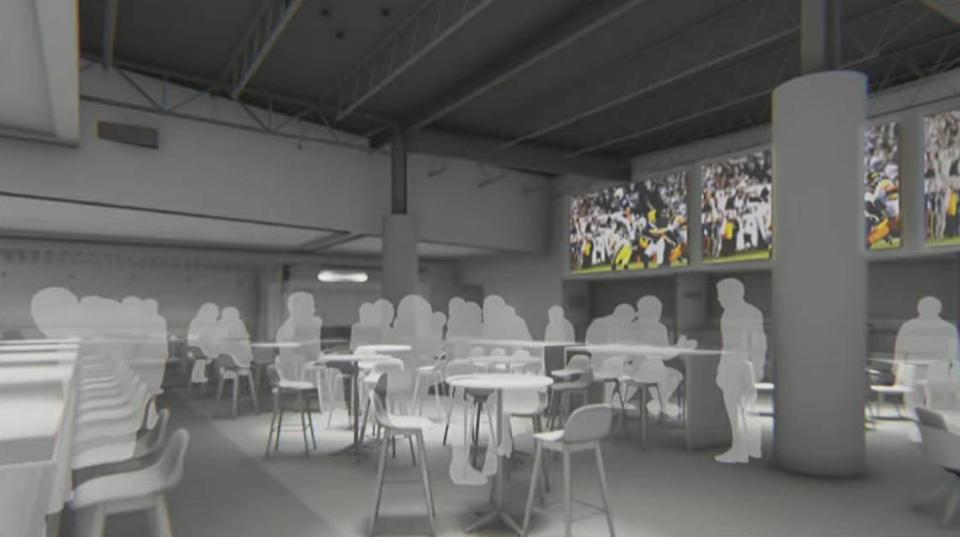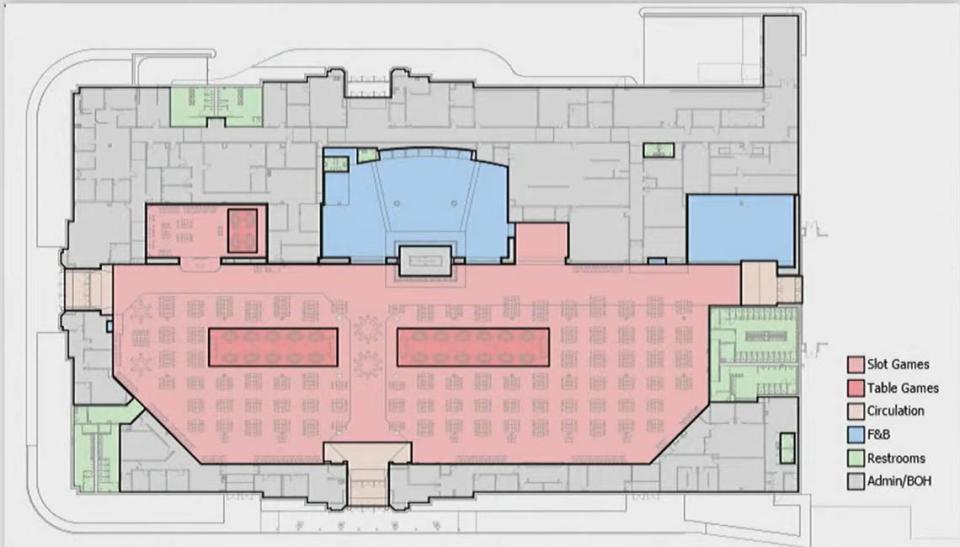State approves license for proposed mini-casino in Centre County. Here’s what we know
After nearly a two-and-a-half year wait, the proposed mini-casino in Centre County finally received state approval Wednesday for its license — but two potential hurdles could still further delay construction.
The Pennsylvania Gaming Control Board voted unanimously in Harrisburg on Wednesday afternoon to OK the mini-casino license for SC Gaming Op Co, LLC and owner Ira Lubert, who intends to construct the $128 million casino at the Nittany Mall in College Township. But the mini-casino license, also known as a Category 4 license, cannot be issued until all appeals are exhausted.
And it’s possible a competitor and losing bidder for the license — Stadium Casino RE, LLC, which runs Live! Casino & Hotel Philadelphia — could choose to appeal. Attorneys for Stadium Casino argued against approval Wednesday, although an official did not immediately respond to the Centre Daily Times when asked whether an appeal was a certainty.
Stadium Casino, part of a Baltimore-based real estate development and entertainment operating company, also has a pending lawsuit in Commonwealth Court that argues Lubert has ineligible partners because some had no prior casino interests in Pennsylvania. It’s unclear if Lubert and Co. would prefer to wait until that lawsuit is resolved before moving forward with construction.
Two attorneys representing Lubert did not immediately respond to the CDT seeking comment on whether that lawsuit would potentially delay construction.
Still, despite potential delays, Wednesday’s approval was a necessary and significant step forward for the casino. It’s the culmination of 11 months of public comment, mandatory state investigations that have spanned years, local impact studies, several public hearings, etc.
No set opening date was released Wednesday, but officials confirmed that construction — once started — should take about a year.
The public hearing involving the proposed casino lasted just under two hours, with a presentation from Lubert’s team that summed up much of what’s already been reported, from the casino’s location, to the positive results of local impact studies, to security features and future plans. Stadium Casino’s argument was limited to 15 minutes, an amount the company’s attorney criticized several times, and the gaming control board’s Office of Enforcement Counsel essentially advised the board to disregard their arguments.
Stadium Casino’s attorney, Mark Aronchick, questioned whether the gaming control board even had the authority to consider the licensing application given what it believes are fatal flaws there. But Cyrus Pitre, the board’s Chief Enforcement Counsel, shrugged that off.
“The authority is in the Act,” Pitre said, referring to earlier state legislation that established the board’s powers. “The Act is replete with the authority of this board. So, as far as I’m concerned, that argument goes out the window. Everything submitted by Mr. Lubert as an applicant is similar to just about every other application that we’ve received ...”
New details about casino
An exterior rendering of the proposed casino was released in summer 2021, but Wednesday marked the first time interior renderings were publicly shown.
Most were in black and white but still gave a sense of what future patrons can likely expect in the 94,000-square-foot space, which Macy’s once occupied. The nonsmoking casino — which plans to operate 24/7 — will have up to 750 slot machines, 30 table games, a sports betting area, a quick-service food court and a sports-themed bar/restaurant with a stage for live entertainment.

Three entrances would surround the casino, two from outside and one from inside the mall. Security with ID scanners would be positioned at each entrance. (There are no plans to allow anyone under the age of 21 in the non-gaming areas, like the food court.)
Lubert also revealed his plans for the prospective CEO and general manager, which would be Eric Pearson, who also addressed the board Wednesday. Pearson is the former president and CEO of Valley Forge Casino Resort, where Lubert served as the former chairman.

He is an adjunct instructor for Penn State’s School of Hospitality Management. And he’s worked at Foxwoods Resort & Casino in Connecticut, the largest casino resort in North America, in addition to several MGM Resorts International-owned casinos on the Las Vegas Strip.
Pearson acknowledged there have been no substantive talks with the university at this point. Penn State’s board of trustees officially declined to take a stance on the casino project in September. (Lubert is a PSU alum and former chair of the board of trustees.)
Benefits, drawbacks?
Wednesday’s public hearing did not include public comment, as two hearings were already specifically held on that and comments were accepted for an 11-month period. As a result, outside of a few questions about Penn State and impact studies, most of the hearing centered on the casino overview and the losing bidder’s legal arguments.
Supporters of the proposed casino point to the economic benefits and the potential revitalization of the Nittany Mall, while more than 1,500 have signed an online petition opposing the casino. Critics point to the potential for crime, strain on services, gambling issues for the vulnerable (e.g. Penn State students) and a community’s overall well-being.
SC Gaming attorney Adrian King, of the law firm Ballard Spahr, addressed the opposition Wednesday.
“I just want to remind the board again: If we go back to the public impact hearing, there was extensive support that day for the people who came to testify, from local officials at the state level, the local level, business leaders, community members,” he said. “All the people who took the time to come and actually appear were universally supportive. We certainly are aware that there are people in the State College Area who don’t support the casino project, but I would submit to the board that the real opposition is they don’t like gaming.
“But respectfully to them — and I will state, respectfully — the Commonwealth itself crossed that bridge back in 2004, when gaming was passed. Most opposition to gaming is based on fears of crime, of underage gaming and responsible gaming not not being conducted. But I think the track record of this industry over the last 16 years has demonstrated that it’s simply an unfounded concern.”
According to officials, the economic impact of a casino would be significant. The casino would be expected to employ between 350 and 400 full-time equivalent positions, and College Township would likely stand to receive about $1.6 million during the casino’s first year of operation. (For comparison’s sake, the township’s annual General Fund Budget is about $10.5 million.)
A PGCB spokesperson previously told the CDT that the host municipality receives 2% of gross revenue from slot machines and 1% of table games. The same goes for the county. However, sports wagering revenue does not specifically go to a municipality or county.
Lubert, who bid just over $10 million for the mini-casino license in September 2020, focused on those benefits in his statements to the board.
“I believe that the Category 4 casino I intend to construct at the Nittany Mall will reinvigorate the property and draw new businesses to the mall itself and the surrounding area,” he added. “This in turn will create jobs and help State College region’s economy grow forward.”

